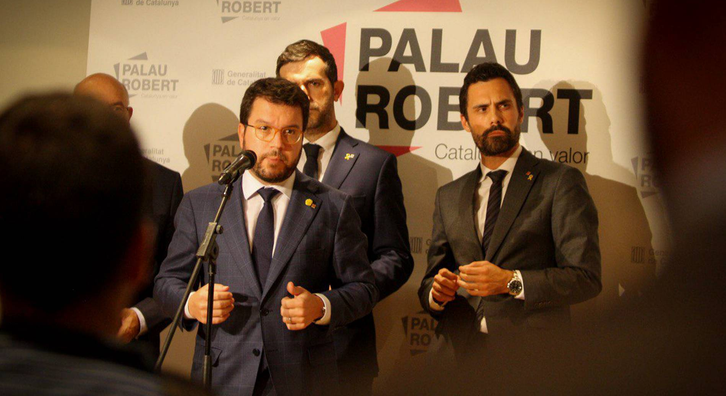- The Vice-President of the Government, Pere Aragonès; Speaker of Parliament, Roger Torrent; and Director of the Anti-Fraud Office of Catalonia, Miguel Ángel Gimeno, have opened the exhibition Corrupció! Revolta ètica, coinciding with the 10th anniversary of the Anti-Fraud Office.
- The interactive exhibition, which will run at Palau Robert from 18 September to 24 November, invites visitors to reflect on the role they can play in improving social harmony and democracy.

Pere Aragonès, Vice-President of the Government and Minister of Economy and Finance, stressed the importance of “raising collective awareness of fraud and corruption, a problem that requires us to think and engage in a process of self-assessment – not only those of us with public duties, but also regular citizens.” At the opening of an exhibition entitled Corrupció! Revolta ètica (“Corruption! Ethical Revolt”), held today at Palau Robert, Aragonès said: “The Catalan government is committed to the fight against fraud and corruption.”
The vice-president pointed to a set of measures the Catalan government has taken to strengthen public integrity and fight corruption. “Between 2015 and 2018, 207,685 control, detection and correction actions carried out by the Catalan Tax Agency helped uncover fraud totalling €740.54 million,” said the vice-president.
Aragonès said the Catalan government is continuing to make progress on its strategic plan for fighting corruption with the Prevention Plan Against Fraud and Corruption 2019–21. “The Plan includes 25 specific actions and projects in areas such as public procurement, taxation and subsidies, which develop the overall strategy. It also envisages a participatory process to engage civil society and get input from anti-corruption experts in order to define the implementation process,” he said.
But Aragonès concluded on a cautionary note: “No matter how many measures we take, how many regulatory changes we introduce, and how engaged the administration is, it’s also very important to change the collective culture. And the ideas at the heart of this exhibition are very important for bringing about this change in public awareness.”
The Speaker of Parliament, Roger Torrent; the Director of the Anti-Fraud Office of Catalonia, Miguel Ángel Gimeno; and the Secretary for Dissemination and Citizen Services, Miquel Gamisans, also participated in the opening.
Roger Torrent said several things were needed to fight corruption effectively: control, surveillance and prosecution mechanisms; an ethics of political responsibility; and a social culture against corruption. “It’s no surprise that, according to the Centre for Opinion Studies, 92% of Catalan citizens say corruption is their biggest concern when it comes to institutions,” he said.
Finally, Miguel Ángel Gimeno focused on the importance of whistle-blowers in the fight against corruption. “The fight against fraud isn’t a just the function of a particular institution; it’s a job for all citizens. That’s the goal behind this exhibition: to make all citizens more aware of this issue,” he said.
Corrupció! Revolta ètica will run from 18 September to 24 November at Palau Robert. The exhibition aims to encourage reflection on corruption and its significance in the process of building an advanced democracy, and to get visitors to reflect on the ways in which their personal attitudes can change and improve corrupt systems on a small scale. Corruption is a corrosive phenomenon that leads to deep social, economic and political crises, generating despair and a sense of impotence in the population, weakening democracy, and, as a result, undermining human rights.